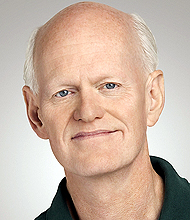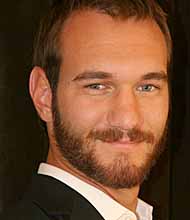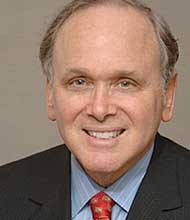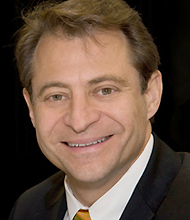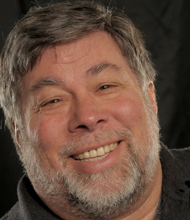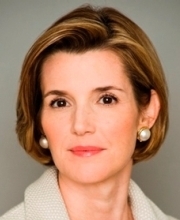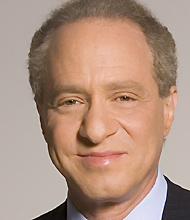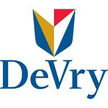| TRAVELS FROM |
|
SPEAKING FEE RANGE ** Please note that while this speaker’s specific speaking fee falls within the range posted above (for Continental U.S. based events), fees are subject to change. For current fee information or international event fees (which are generally 50-75% more than U.S based event fees), please contact us. $50,000 to $75,000 |
|
BOOK MARSHALL GOLDSMITH speakers@coreagency.com |
| TRAVELS FROM |
|
SPEAKING FEE RANGE* $50,000 to $75,000 |
|
Book Marshall Goldsmith speakers@coreagency.com |
- Regarded as the world’s most influential leadership thinker by Thinker50 and the world’s leading executive coach by Thinkers50, Fast Company, Inc. Magazine, and Global Gurus.
- Goldsmith’s most recent book, Trigger, reached #1 on both the New York Times and Wall Street Journal bestseller lists.
- Stakeholder Centered Coaching process has produced over 1,500 leadership coaches.
- Goldsmith presents cutting-edge leadership advice with clear organization and easy humor.
Marshall Goldsmith is an executive educator and coach with a gift for helping CEO and other corporate leaders to creatively engage change in the workplace. His Stakeholder Centered Coaching process has become a highly successful training program, producing over 1,500 leadership coaches who further disseminate Goldsmith’s sage advice.
Voted the world’s most influential leadership thinker by Thinkers50, Goldsmith’s bestselling publications have been translated into 32 languages reaching millions of people. His latest book, Trigger, reached the top spot on both the New York Times and Wall Street Journal bestseller lists. Goldsmith’s video presentations have garnered over 2.5 million views.
Thinkers50, Fast Company, Inc. Magazine, and Global Gurus all regard Goldsmith as the world’s leading executive coach. His clients have ranged from Ford Motor Co. and Glaxo SmithKline to the Girl Scouts of America.
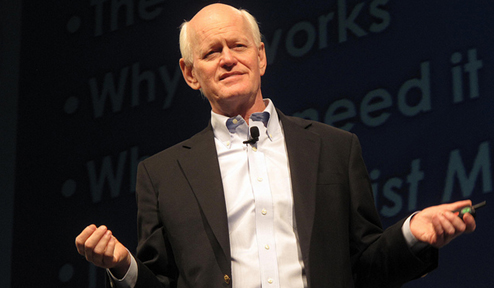 I want to help successful leaders achieve positive lasting change in behavior, so they don't just walk away and say it was a fun presentation or a good presentation, but they achieve positive, lasting change over time. I want to help successful leaders achieve positive lasting change in behavior, so they don't just walk away and say it was a fun presentation or a good presentation, but they achieve positive, lasting change over time. | |
| |
 | What do you want people to learn and take away from your presentation? |
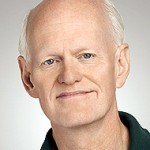 | I want people to learn how to achieve positive lasting change in their behavior. My mission is to help successful leaders get even better. If you do a Google search 'Helping successful leaders,' of the top 500 hits, 450 are me. My mission is very clear. I want to help successful leaders achieve positive lasting change in behavior, so they don't just walk away and say it was a fun presentation or a good presentation, but they achieve positive, lasting change over time. |
 | What types of audiences would most benefit from your message? |
 | It depends on the course I'm teaching. If my course is about Succession, it would be really a very high end executive audience. If it's What Got You Here Won't Keep You There, it would probably be pretty much anyone in a leadership role. Or if it's about my books Trigger or MOJO, it could be anyone because these books are about messages applied to any kind of audience. So, the type of audience would depend on what my message is. |
 | What kind of special prep work do you do prior to an event and how do you prepare for your speaking engagements? |
 | I try to learn, and since most of the people I work with are leaders, I try to interview the CEO and make sure that the message that I deliver is consistent with the vision the CEO has for the organization, because I found that if you don't have top management support behind what you're saying, you're probably wasting your time, or even worse, going backwards. |
 | Which of your keynote speaking topics are your favorites and why? |
 | My favorites would be "What Got You Here Won't Get You There: Helping Successful Leaders Get Even Better." Thesecond one would be "Triggers: Creating Behavior That Lasts... Becoming the Person You Want to Be," and the third one would be "MOJO." So these three would be my favorite topics. Why? They're all related to important books that I've written, and they're all topics that emotionally I just love. I really believe in helping people achieve positive, lasting change. |
| I'm very proud of the fact that in my book, Triggers, 27 major CEOs whom I have coached endorsed the book. | |
| |
 | What inspired you to start doing speaking engagements? |
 | Well, I met Dr. Paul Hersey, a very famous person who was one of the highest-paid speakers in our field. He was kind enough when I was a young man to let me follow him around and learn to do what he did. He got double-booked one day, and he asked me, "Can you do what I do?" I said, "I don't know." He said, "I'll pay you $1,000 a day." I was making $15,000 a year. I said, "I'll try."
I did a program for the Metropolitan Life Insurance company in New York. They were very upset because I wasn't him, but I got ranked first place of all the speakers. I was 28 years old; $1000 a day 38 years ago was a lot of money. They were very happy. They said, "We'd like to hire Marshall again." That's how I got into this business. A lot of life is luck. And help from a great person, Dr. Paul Hersey. |
 | What are some of the successes you've helped clients make? |
 | From a micro-level perspective, as an executive coach, I don't get paid if my clients don't get better. And I help my clients to make positive long-term change. The most important behavior is judged by the most important people. I'm very proud of the fact that in my book, Triggers, 27 major CEOs whom I have coached endorsed the book. These are 27 of the most important leaders of the world who stood up and said, "I have a coach. It's okay. I'm trying to get better."
What I'm really proud of is the fact that 30 years ago, coaching was something leaders would be ashamed of. They'd be embarrassed to admit they have a coach. Today, it's something people are proud of. That's a really positive change I think I've helped make. The second change is at the macro level. In my speaking, we did a study called "Leadership is a Contact Sport" that showed the impact not just of people enjoying a program, but the impact a year later in terms of positive change in leadership behavior. This was a study involving 86,000 people from eight major corporations. |
"We were a very successful team who took our performance to the next level. With Marshall's help we identified our two areas and went to work. We used everyone's help and support, exceeded our improvement expectations and had fun! A team's dedication to continuous improvement combined with Marshall's proven process ROCKS!"
Alan Mulally, CEO, Ford Motor Company
"As the CEO of the Girl Scouts, I was working to help a great organization become 'the best that we could be'. The first person Marshall volunteered to work with was me—this sent an important message. I was exuberant about the experience, I improved and we moved this process across the organization. Now I am Chairman of the Leader to Leader Institute - and we are still working together to serve leaders."
Frances Hesselbein, Presidential Medal of Freedom honoree
"Marshall is a great coach and teacher. He has done a lot to help both me and our high-potential leaders. His approach is practical, useful, helpful and fun!"
JP Garnier, CEO, Glaxo SmithKline
"At McKesson, we are on a mission—together with our customers—to fundamentally change the cost and quality of how healthcare is delivered. To fully realize the potential that lies in this transformation, our leaders must be able to demonstrate values-based leadership practices to maximize employee engagement each and every day. Marshall's teachings remind us of how personal growth and change are a never ending journey."
John Hammergren, CEO, McKesson
"Marshall Goldsmith has helped me become a more effective leader—as judged by the people who are most important at Getty Images—our employees. Marshall has helped me and my executive team members to be much better positive role models for living our Leadership Principles."
Jonathan Klein, CEO, Getty Images
"Marshall has helped me personally to improve as a leader and has provided the tools and dynamics to turn a well-functioning management team into a high-performance team, where all the members have improved individually, and considerably added to team performance."
David Pyott, CEO, Allergan
"Marshall is a dynamo. He helps highly successful people get better and better and better. His advice helps me enormously at work, but it makes an even bigger impact at home. My wife and kids stand up and applaud Marshall for helping me become a better husband and dad. What could be better than that?"
Mark Tercek, Managing Director, Goldman Sachs & Co
"A great coach teaches you how to improve yourself. Marshall is a great coach! He has a unique ability to help you determine what you can improve and what will have the greatest impact on the people you lead and love."
Brian Walker, CEO, Herman Miller
Marshall Goldsmith is an internationally recognized leadership guru who has managed to maintain the folksy charm of the small Kentucky town where he was born. As a result, Goldsmith’s presentations combine cutting-edge analysis and remarkable insight with down-to-earth style and an easy, self-deprecating sense of humor.
Goldsmith helps his clients understand that even past success may not predict future growth and achievement. As he puts it, what got you here may not get you there – wherever your hoped-for “there” may be. Goldsmith offers practical tools and research-tested data to inspire fresh growth and development.
Leaders may benefit from Goldsmith’s advice on how to build a talent-rich organization. Clients seeking rejuvenation will appreciate the applicable advice of Goldsmith’s “Mojo Tool Kit.” Regardless, audiences will leave entertained, informed, and inspired to take new steps toward realizing their potential.
How to get and keep your mojo. What to do to get it back if you lose it.
The skills, talents and abilities that got you here, may not get you there.
Looking at the challenges for leadership success in the new millennium.
Leadership in the Global Organization
Sales success in the new world of customer expectations.
Align your talent practice to business outcomes.
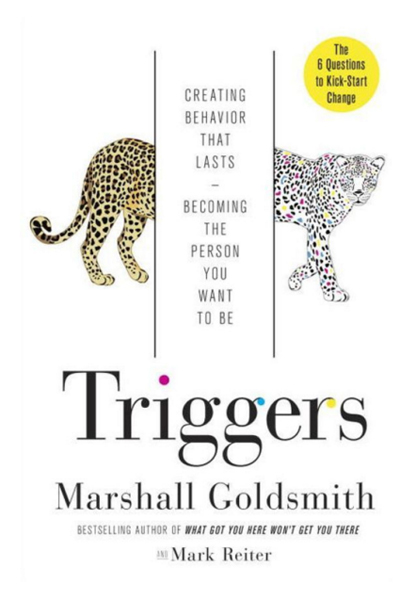
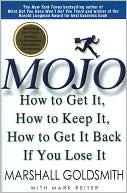
Mojo: How to Get It, How to Keep It, How to Get It Back if You Lose It!
In his follow-up to the The New York Times bestseller, What Got You Here Won't Get You There, #1 executive coach, Marshall Goldsmith, lays out the ways that we can get—and keep—our Mojo.
Our professional and personal Mojo is impacted by four key factors: identity (Who do you think you are?), achievement (What have you done lately?), reputation (Who do other people think you are—and what have you done lately?) and acceptance (What can you change—and when do you need to just 'let it go'?).
Mojo is: that positive spirit toward what we are doing now that starts from the inside and radiates to the outside. Mojo is at its peak when we are experiencing both happiness and meaning in what we are doing and communicating this experience to the world around us. The Mojo Toolkit provides fourteen practical tools to help you achieve both happiness and meaning—not only in business, but in life.
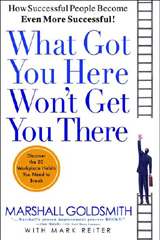
What Got You Here Won't Get You There
How Successful People Become Even More Successful
Goldsmith, an executive coach to the corporate elite, pinpoints 20 bad habits that stifle already successful careers as well as personal goals like succeeding in marriage or as a parent. Most are common behavioral problems, such as speaking when angry, which even the author is prone to do when dealing with a teenage daughter's belly ring. Though Goldsmith deals with touchy-feely material more typical of a self-help book—such as learning to listen or letting go of the past—his approach to curing self-destructive behavior is much harder-edged. For instance, he does not suggest sensitivity training for those prone to voicing morale-deflating sarcasm.
His advice is to stop doing it. To stimulate behavior change, he suggests imposing fines (e.g., $10 for each infraction), asserting that monetary penalties can yield results by lunchtime. While Goldsmith's advice applies to everyone, the highly successful audience he targets may be the least likely to seek out his book without a direct order from someone higher up. As he points out, they are apt to attribute their success to their bad behavior. Still, that may allow the less successful to gain ground by improving their people skills first.
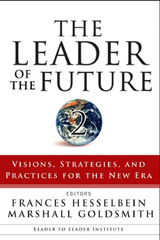
The Leader of the Future 2
Visions, Strategies, and Practices for the New Era
The Leader of the Future 2 follows in the footsteps of the international bestseller The Leader of the Future, which has been translated into twenty-eight languages, and is one of the most widely distributed edited collections on leadership to date. In twenty-seven inspiring and insightful essays, this book celebrates the wisdom of some of the most recognized thought leaders of our day who share their unique vision of leadership for the future.

In this interview, Marshall discusses:

 VIDEO
VIDEO TESTIMONIALS
TESTIMONIALS PROGRAMS
PROGRAMS SPEAKING
SPEAKING BOOKS
BOOKS INTERVIEW
INTERVIEW